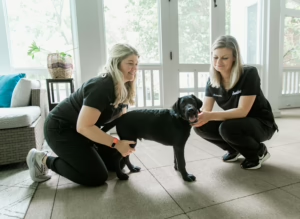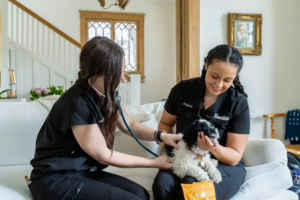Welcoming a puppy is an exciting new chapter for any family!
As veterinarians, we see many, many puppies and kittens for their first vet visit and want to help new pet parents establish a strong care foundation from day one. Just like with babies, the best way to ensure a lifetime of health and happiness for your puppy is through proactive preventative care, such as staying up to date on vaccines and bloodwork.
The First Vet Visit
Most animal shelters, rescues and breeders begin vet visits for puppies before they go home to their new families. When you take your puppy home, you should receive paperwork that establishes what care has already been provided (including dates) and when you should schedule your puppy’s next veterinary visit.
Your first official vet visit will establish a positive care relationship with your veterinarian through a wellness exam and to begin vaccinations and preventative treatments. Whether the first visit takes place in a traditional veterinary clinic or in the comfort of home during a mobile vet visit, this time is important to establish trust and familiarity with your puppy and their veterinarian.
Every puppy should have a comprehensive nose-to-tail examination to make sure everything is working just right and establish a vaccination schedule. During the exam, the veterinarian will:
- Take your puppy’s vitals including weight and body temperature
- Examine your puppy from nose-to-tail including eyes, ears, nose, feet, teeth, nails, skin, coat and genitalia
- Open their mouth to observe their teeth, gums, tongue and jaw
- Check their eyes and ears with instruments that provide light and magnification
- Palpate (using hands to feel) the lymph nodes, joints and organs within the abdomen
- Listen to their heart and lungs via stethoscope
Questions to Ask Your Veterinarian
As vets, we share in your excitement of having a new puppy to love and build a bond with! During new puppy vet visits, our best advice is to ask any and all questions, but make sure you walk away from the visit having discussed important aspects of dog care including:
- Breed-specific conditions and care
- Establishing a vaccination schedule for core and non-core vaccines
- Nutrition advice for daily meals, supplements and treats
- Reproductive health, including the best age to spay or neuter your puppy
- Prevention of intestinal parasites, heartworms, fleas and ticks
- Dental health including product recommendations and at-home dental care
- Behavior and socialization, including advice on daycare and boarding
- Pet identification such as microchips
Puppy Vaccines
Just like a newborn baby, puppies and kittens need vaccines because of how vulnerable they are to serious diseases at a young age. While they do receive some protection through antibodies in their mother’s milk, that protection is not long-lasting. Our Canine Vaccination Guidelines outline recommended vaccine schedule established by the American Veterinary Medical Association (AVMA). This cadence of vaccines protects puppies early in life before they risk contact with harmful or life-threatening diseases.
As recommended by the AVMA, “To provide the best protection against disease during the first months of life, your veterinarian will recommend a series of vaccinations, usually 2-4 weeks apart. For most puppies and kittens, the final vaccination in the series is given at about 4 months of age. Your veterinarian may adjust this schedule based on your pet’s circumstances and needs.”
The core vaccines we recommend for puppies – based on AVMA and AAHA guidelines – include canine parvovirus (CPV), canine distemper virus (CDV), canine adenovirus (CAV), and rabies.
Other non-core vaccinations are appropriate in certain situations. These may include Bordetella, Lyme and leptospirosis (recommended for almost all dogs) vaccines if there are risks of those diseases based on your geographic location and lifestyle. At your first visit your veterinarian will consult you to determine which vaccines they recommend based on risk factors for contracting these diseases.
Read more: Why You Need To Vaccinate Your Pet
Neutering and Spaying – What is it?
A neuter is a routine surgical procedure done to remove a male dog’s testicles, thus making them sterile.
A spay is a routine, elective surgery for sterilization for female dogs, meaning they won’t produce any litters of puppies.
By neutering or spaying your new puppy, you can curb the birth of unwanted pets. Plus, studies have repeatedly shown that spayed or neutered dogs live longer on average than other dogs. While having surgery performed on your puppy sounds scary, there are health and behavioral benefits of this routine, elective procedure.
- Health Benefits: Spaying your dog can protect against serious diseases later in life like breast, uterine or ovarian cancer in female dogs and pyometra, a serious and potentially life-threatening uterine infection that impacts up to 25% of unspayed female dogs. Meanwhile, testicular cancer is the most common cancer to affect unneutered male dogs.
- Behavioral Benefits: Spaying a female dog eliminates their heat cycles and reduces mating-related behavior that frustrates owners. Neutering a male dog and removing their testicles reduces their breeding instinct, meaning they are less likely to roam, mount furniture or mark their territory.
When Should I Spay or Neuter My Pet?
There is no one-size-fits-all recommendation for when to spay or neuter but the common age is six months or later. Consult your veterinarian at your puppy’s first visit and they will make a recommendation based on your dog’s breed, age, sex, health, role (e.x. pet or working dog) and home environment.
The Importance of a 10-Month Puppy Exam
While navigating the first year of having a puppy is both exciting and challenging, this initial period plays an essential role in your dog’s behavior and overall wellbeing. While your puppy’s last vaccination will most likely end at 4 months, we recommend a wellness exam at 6-7 months later to examine your pup. This is because your puppy at 10 months is physically more like an adult dog, but they’re still in a period of rapid growth.
With year one being the most formative year of your puppy’s life, a 10-month visit will:
- Include a complete wellness exam of your puppy, including stool and blood tests
- Making a decision to spray, neuter or microchip your puppy
- Address weight management, diet and nutrition needs of a growing puppy
- Discuss any health roadblocks to training, socialization and behavior
- Dental check to prevent retained baby teeth or problems with growing adult teeth
- Gait, reflex and conformation check to protect bone, joint and muscle growth
Between your puppy’s first vet visit, 2-4 week vaccinations and a 10-11 month wellness exam – you’ll be seeing your veterinarian a lot during your puppy’s first year of life. Vet costs for puppies should always be considered as part of pet ownership, but know it’s money well-spent in preventing more serious, expensive health problems later in life.
Your Best Furiend + Your Vet
With clumsy steps, puppy eyes and joyful curiosity, puppyhood is a fun and special life stage! By taking care of your puppy’s health during development, you’ll be setting your best friend up for a healthy adulthood. And remember that from your puppy’s very first visit, you’ll always have a trusted confidant and advisor in your veterinarian. Part of our jobs is to support our canine-patients, and their pet parents – across every stage of life.
Book your first puppy exam today and discover the convenience of veterinary care in the comfort of your Dallas, Nashville or Atlanta home!




